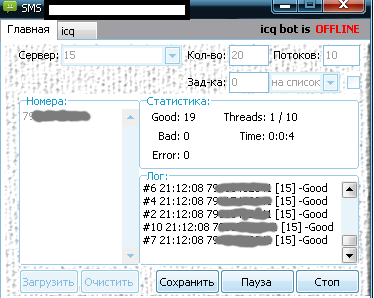Just like in every market, in the underground ecosystem demand too, meets supply on a regular basis.
Thanks to the systematically released DIY SMS flooding applications, cybercriminals have successfully transformed this market segment into a growing and professionally oriented niche market. From the active abuse of the features offered by legitimate infrastructure providers such as ICQ and Skype, to the abuse of Web-based SMS sending gateways, cybercriminals continue developing and releasing point’n’click DIY SMS flooding tools.
In this post, I’ll profile one of the most recently released DIY SMS flooders, this time relying on 23 publicly available SMS-sending Web services, primarily located in Russia.
More details:
Sample screenshot of the recently released DIY Russian SMS Flooder:
According to the original advertisement, the DIY SMS flooder supports 23 different servers, which are primarily Web-based free SMS sending gateways. It can also be controlled using an ICQ bot, and it also has the capability to simultaneously flood multiple mobile numbers at the same time. The ad is also emphasizing on the fact that these servers don’t require a registration, and that they can process an unlimited number of SMS messages.
It’s also worth pointing out that the author of the application is offering 200 free SMS messages for testing purposes, before a prospective customer purchases the application. The price? 20 WMZ (WebMoney currency) which includes free and periodic updates of the servers list.
We’ll continue monitoring the development of the application.
You can find more about Dancho Danchev at his LinkedIn Profile. You can also follow him on Twitter.







